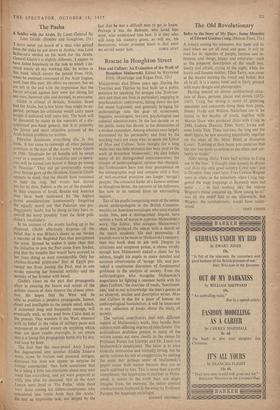The Old Revolutionary
A WEIALE among the minnows, this book will be read When we are all dead and gone. It will be read for its vignettes of people, famous and in- famous, and things, happy and otherwise—such as the poignant description of the small boy, lonely and afraid, crying in the night, while his lovely and famous mother. Ellen Terry, was away at the theatre earning the bread and butter. But all in all, it is a sunny book and is finely printed with many designs and photographs.
Having erected an almost architectural ,struc- lure of dates, persons, places and events (1872- 1907). Craig has strung a series of glittering anecdotes and comments along these bare poles. Jimmy Pryde and William Nicholson are to be found in the heyday of youth, together with Martin Shaw who produced Dido with Craig in 1900, Isadora Duncan, Ellen Terry, Irving and even Little .Tich. These last two, the long and the short figure, he saw standing improbably together on the steps of the Mitre Hotel at Hampton Court : 'Looking at their faces, you could see that the one was quite as serious as the other, and cer- tainly as tragic.'
After seeing Dido, Yeats had written to Craig out of the blue : 'I thought your scenery to iEneas and Dido the only good scenery I ever saw'; but at Dresden, four years later, Frau Cosima Wagner went as white as the tablecloth when Craig sug- gested the stage trappings at Bayreuth were not quite . . . in fact nothing like the visions Wagner's niusic conjured up. 'How young he is!,' was all she could find to say afterwards. But Wagner, the revolutionary, would have under-


































 Previous page
Previous page